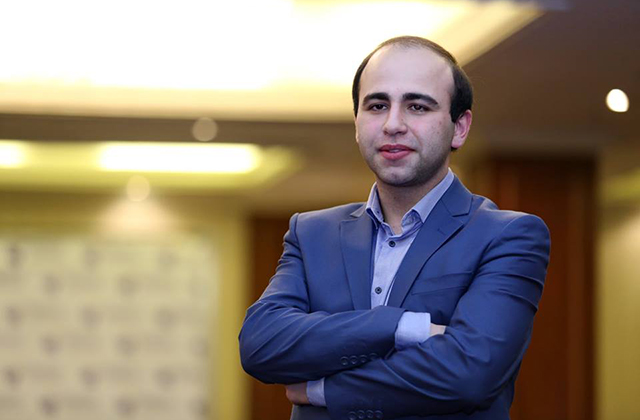Lack of Armenia-EU Agreement Perspective Gives Ground Presuming, this Time again Armenia won’t Face Political Obstacles: Armenak Minasyants

Armenak Minasyants, expert of YSU Center for European Studies, alumni of the USA Fletcher School of Law and Diplomacy, is the interviewee of 168.am.
– After a two-year pause European Union and the Republic of Armenia launched negotiations on development of framework agreement. Despite Armenia’s membership to Eurasian Economic Union (EEU), European and Armenian officials claim, new agreement will have both economic and security components in the form of amendments. Against the background of revised Eastern Partnership Neighborhood policy, as well as Armenia’s current external and internal challenges, what do you think, what the parties may propose to one another? What has changed since September 3 that might give ground to consider, that new negotiations will be successfully concluded and amendments will be implemented?
After the well-know 3 September 2013 resolution almost all expert circles were expressing distrust that Armenia-EU ties may ever come to the former level. At the same time, 3 years have passed, and unprecedented geo-political transformations occurred in the post-Soviet space. Military actions in the Ukraine, annexation of the Crimea, sharp tension of Russia-NATO, Russia-EU relations and economic sanctions instigated EU to categorically revise its European Neighborhood Policy (ENP), in particular, towards EaP member countries. Thus, provision of stability will be political priority of ENP mandate, and differentiated approach and wider mutual affiliation will be new ENP next crucial components, accepting, that not all EU partners, including Armenia, strive to correspond to EU regulations and standards, taking into account each country’s aspirations with EU partnership nature and frames. At the same time, EU will try to keep high and stimulate universal values through ENP, striving to define more productive ways for democracy, human rights, fundamental freedoms and rule of law. In this context, one of RA foreign policy present-day directions is successful upload of Armenia-EU ties and quick finalization of negotiations over framework agreement. Armenia-EU ties and this new agreement will have primary importance for the development of Armenia’s further democratic and economic development, although in their nature and depth Armenia-EU relations will be too far from formerly proposed association agreement. Under such conditions lack of perspective of negotiated accord gives ground to suppose, that this time Armenia won’t face any political obstacles. It seems, Russia isn’t against at all, that EEU member country Armenia strives maintaining good neighborly ties with EU.
-Some Armenian experts argue that Armenia-EU relations will remain unaccomplished, as there are no such powers in Armenia striving for improvements and imagine Armenia’s future through injection of European values. What do you think of these allegations?
Unfortunately, I have to share this pessimism. The guilty for September 3 failure were political powers themselves, which didn’t do any work with our society to find out what Armenia will gain from Association Agreement with EU. In its turn civil society and NGO representatives were more attracted by future programs, rather than working with the society. As a result, we had shameful voting in the National Assembly and only 7 “No” votes to EEU membership. And if unanimous vote by authorities was already predictable, then quite terrible was voting of the so-called opposition, which tried to appear as more pro-Russian, than the authorities. At the same time, blaming political power for not being pro-European or pro-West isn’t right as well. Generally, one of the biggest issues of Armenia’s domestic policy is eternal separation of black and white, pro-West and pro-Russian. If we want Armenia to really become a European model country, first and foremost, qualified generation change in all power branches, i.e. new faces, new approaches, and simply new people are needed, which are able not only to speak in favor of improvements, but to ruthlessly fight for them, not to depend on certain inner-group business frames. Change should be recorded in Armenia’s citizen’s mentality, and perception of the world. The citizen should realize, not political powers initiate improvements, but they simply represent social demand and aspirations of citizens on political level. At the moment there are a number of initiative political powers, which have aspirations to bring in new culture and modern approaches to 2017 Parliamentary elections. Their success will be victory for all of us.
-In your opinion when Armenia—both the society and political system, will be able to associate with EU?
I consider, the majority of our society in near future wants to see Armenia, which will be a country for possibilities, in which productivity of public administration institutes, rule of law, and application of international democracy experience will be available, with combination of our best national peculiarities and interests. This is the way, by which it’s possible to build European model Armenia and the sooner likewise approach will dominate, the quicker our society and political field will be ready for changes.
-During this year Armenia-EU bilateral agreement, based on some promises, might be ready. Under current conditions what kind of accord it’s going to be?
Currently we should first and foremost break and forget the illusion, that Armenia is taking a step back to its “and-and” policy. This approach is being widely circulated especially by the authorities, by that, drawing wider circles of society to confusion. Armenia, unfortunately, by refraining from Association Agreement and Deep and Comprehensive Free Trade Agreement in 2013, was deprived of a market of 500 million, as well as considerable European investments in the field of economy, and in political field it was a chance to conduct more constructive and independent foreign policy line. Instead, we’ll have an accord referring rather limited circle of cooperation.
–MFA of Netherlands stated on January 18, that maintenance of status quo on Nagorno-Karabakh conflict zone is inadmissible, moreover, conflict resolution is a priority for EU. How can we understand this statement? To your mind, can EU provide security of NKR, in particular, of Armenia, of course, not directly, as EU is not a structure for security provision?
Last December, at CSTO member countries’ session in Moscow, president S.Sargsyan spoke of deep concerns in NKR conflict resolution, which were available on expert level long ago and with time were becoming dominant among Armenia’s society as well. It’s important, that we had a sober view of the situation. Armenia is a member of a regional security structure, which has never performed any serious military-political activity and even doesn’t have clear disposition of its member countries on regional conflicts (Crimea/Ukraine, South Ossia and Abkhazia, Nagorno-Karabakh). Under this condition, there is no need to expect any serious and real action by CSTO. In this context EU strives to assume more constructive role, however, due to its limited possibilities it’s not able to have real impact on NKR issue settlement. In fact, I’m of the opinion, that EU would like to have more and more active role in Karabakh settlement, but sober assessment of personal capabilities dominate in Brussels, as well as realizing, that OSCE Minsk group is an internationally recognized institution and exactly within this conflict it should have its peaceful settlement. At the same time, already after peaceful settlement of the conflict, EU may be more active and contribute to consolidation of trust amongst societies.
-Which steps are necessary for EU to decrease Armenia’s dependency from Russia and what is EU ready for?
Not steps by EU are necessary to weaken dependency from Russia, but my and your readiness to see more independent Armenia. If you want to speak of stronger positions on diplomatic platforms, it’s necessary to put up unsparing and real struggle in Armenia against corruption and injustice, as well as successfully implement amendments tended to raising public administration efficiency, rooting democracy and human rights and freedoms protection. In its turn, EU has already proven its aspiration to cooperate with Armenia, even under most complicated conditions.
By Araks Martirosyan

























